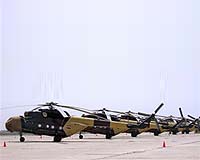| . |  |
. |
Washington (UPI) Jun 12, 2009 The Bush administration was vocal in pointing out the possible implications of any total U.S. military withdrawal from Iraq. Many of these consequences may yet occur. The possibility that extreme Islamist forces -- either Sunni or Shiite or a combination of both backed by Iran -- may seize the country and radicalize it are very real. The problem is that by now the Bush administration has lost all credibility. Few listen to them. President George W. Bush left office in January with one of the lowest favorable ratings in U.S. history, largely because of his policies in Iraq. We know why. Bush compiled a documented record of all too many misrepresentations, too much braggadocio, too much hubris and far too many mistakes. After his party lost control of both houses of Congress in the November 2006 midterm elections, Bush finally acted to belatedly remove the most egregiously incompetent leaders in his administration, most notably Defense Secretary Donald Rumsfeld, and replaced them with a far more able team led by Defense Secretary Robert Gates, who President Obama asked to stay on in his new Democratic administration. Thus, at the end of 2006 Bush finally conceded, but only grudgingly and obviously under the duress imposed by political defeat, that huge mistakes had indeed been made. To all this, one has to add Bush and his team's ongoing dogged persistence in confusing effects for causes on the issue of the active threat represented by Islamic terrorists in Iraq, before as opposed to after the U.S.-led invasion of March 2003. Al-Qaida and its affiliates, after the invasion, seized their opportunity and made messy Iraq an important, if not key, battlefield in which to continue their jihad against the West. Because al-Qaida appeared on the scene in Iraq almost at the beginning of the troubles there, the Bush administration declared that, since U.S. forces were fighting al-Qaida and its allies in Iraq, it was supposedly a plain fact that the Iraq campaign was therefore integral and even indispensable to the larger war on terror. But this proved to be completely false. For longtime Iraqi dictator Saddam Hussein -- whatever evil plans he had concocted, and whatever support and sanctuary he gave to some terrorists -- was a secular despot, interested only in increasing his own secular power. Saddam therefore cannot be portrayed as a religious fanatic aiming at the re-establishment of some theocracy or Islamic Caliphate, with Shariah law universally imposed. He was a dangerous enemy to the United States and to moderate Arab states in the Middle East; but he was not another Osama bin Laden, nor was he bin Laden's logical ally. It is essential to discount all these arbitrary connections that Bush and his senior lieutenants insisted upon believing in order to make war on Iraq as part of their war on terror. However, it would still be wise to examine the warnings about withdrawing from Iraq that Bush and his later policymakers continued to issue until they left office. These warnings in fact were serious, realistic and probably prescient. They should not be dismissed as more propaganda or the incoherent ramblings of monomaniacal individuals. (Paolo Liebl von Schirach is the editor of SchirachReport.com, a regular contributor to Swiss radio and an international economic-development expert.) (United Press International's "Outside View" commentaries are written by outside contributors who specialize in a variety of important issues. The views expressed do not necessarily reflect those of United Press International. In the interests of creating an open forum, original submissions are invited.) Share This Article With Planet Earth
Related Links Iraq: The first technology war of the 21st century
 Analysis: U.S. pulls back troops in Iraq
Analysis: U.S. pulls back troops in IraqBaghdad (UPI) Jun 11, 2009 U.S. forces are steadily closing or transitioning bases around the country and repositioning manpower to meet a pullback deadline set by the new Strategic Framework Agreement governing continued American presence in the country. In mainly rural Diyala province, north of Baghdad, only about five of 14 facilities in use at the beginning of the year will remain under U.S. authority come ... read more |
|
| The content herein, unless otherwise known to be public domain, are Copyright 1995-2009 - SpaceDaily. AFP and UPI Wire Stories are copyright Agence France-Presse and United Press International. ESA Portal Reports are copyright European Space Agency. All NASA sourced material is public domain. Additional copyrights may apply in whole or part to other bona fide parties. Advertising does not imply endorsement,agreement or approval of any opinions, statements or information provided by SpaceDaily on any Web page published or hosted by SpaceDaily. Privacy Statement |